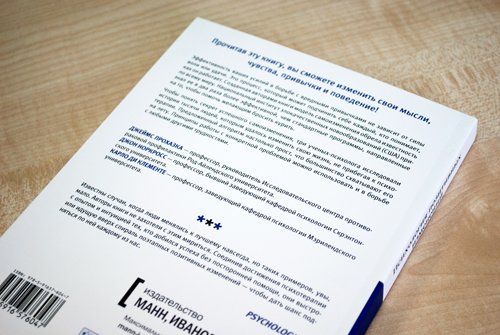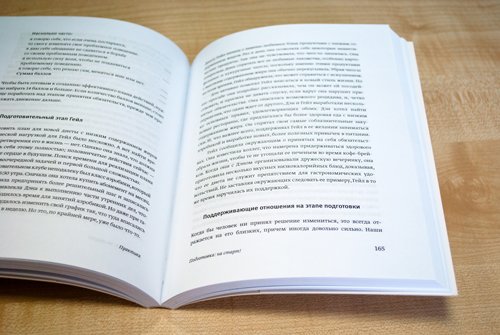What does it take to quit smoking? Willpower, determination and common sense – you tell me. Then it turns out that those who could not or abandoned, but broke down, weak-willed, uninitiative and irresponsible people?
James Prochazka, John Norcross and Carlo di Clemente strongly disagree with such extremes. They are convinced that anyone can get rid of bad habits on their own if they know how to act.
The answer to the questions "how and what to do?" is the model of positive change, which is described in this book.

The model of positive changes developed by Dr. James Prochazka, practicing psychologist John Norcross and his assistant Carlo di Clemente is the result of many years of psychological and sociological research.
Currently, this model is recognized and highly appreciated by the world's leading psychotherapists. It is used by the US National Institute on Alcoholism, the National Institute of Malignant Neoplasms, the American Association for the Fight against Lung Diseases, the American Cancer Society and many other public and public health organizations.
Its authors did not invent the bicycle. They analyzed numerous methods and techniques of psychoanalysis and established an interesting pattern. All existing methods are effective if timely.
Self–change is a complex and lengthy process. It is extremely important to know what stage you are at.
Scientists empirically identified 6 stages of self-change, and also found that the passage through the stages is not linear, but spiral.

A person who has problems (alcohol, drugs, overweight, gambling addiction, whatever), as a rule, does not notice or denies them. "I smoke, but I can quit at any time".
In addition, he is constantly looking for excuses for himself. "My job is too nervous, I have the right to relax and have a beer in the evening". And if he doesn't find it, he starts blaming everyone around him – "How to control your anger if there are only sheep on the roads?".
As a result, his hands give up – "What's the point of swearing not to eat after 6, if you know that it won't work?".
Such phrases are nothing but psychological defense mechanisms exposed by the subconscious mind at the stage of resistance to change.
This is a difficult and painful stage. After all, at some point I will have to break myself, admitting, yes, I have problems.
What methods and techniques of psychoanalysis will help in this, you will learn on the pages of the book. In my opinion, the most effective is to increase awareness and destroy psychological defense mechanisms.
Realizing the existence of problems, a person begins to think about them. "What is the probability that I will get lung cancer?", "My shortness of breath is a "bonus" of overeating?", "What do my children think about me when they see me drunk?"...
Such questions provoke the collection of information. A smoker no longer switches to another channel, having got to a film about the dangers of nicotine. An overweight person buys books about diets. An alcoholic does not translate the topic after hearing the terrible word "cirrhosis".
But, unfortunately, thinking is not the same as doing. Some people have been thinking about their problems for years.
That is why the most important technique at this stage is the reassessment of one's Self. You should not just think about the problem, but see yourself as a non-smoker, fit, sober.
Many mistakenly believe that, having realized and reflected, a person is obliged to take action. In fact, the authors of the book warn readers: premature actions are fraught with a "rollback" to the initial state of denial.
You have to be ready for change. Therefore, the method of making commitments at the third stage becomes the leading one.
By taking responsibility, you naturally begin to make changes in your life. "I will not go to a party on Friday, but on Saturday we will go to the zoo with my family", "I will choose a non-smoking room, I will spend at least one evening without cigarettes".
Feeling sufficiently prepared, a person proceeds to active actions. Or rather, to the complete rejection of booze, cigarettes, fatty foods and other addictions.
The main thing during this period is self–control. Think before you do, and do it after thinking carefully.
It is noteworthy that James Prokhazka and his colleagues assign a minor role to willpower. In their opinion, it is much more important to avoid temptations and change the environment (throw all alcohol out of the house, not buy cakes, change the social circle, etc.).
The opposite point of view was expressed by Kelly McGonigal in the book "Willpower. How to develop and strengthen". In her opinion, willpower is like a muscle and a pack of cigarettes lying "just in case" in the table is a "barbell" for pumping it up.
If you've ever lost weight, you know: it's easy to lose weight, it's much harder to keep the result. If, after a strict diet, you start eating everything again, without any restrictions, the dropped kilograms will return and multiply.
This applies to all bad habits. That is why the stage of saving changes is the longest. The work on yourself is not so intense anymore, but it is continuous.
Otherwise, it's easy to fall into the trap – "I threw once and I'll throw again". The support of loved ones is very important here.

There are two types of people. Some do not change until the end, and remain at the stage of preservation. All their lives they have to take care of themselves and their habits.
For others, the moment of deliverance comes one day. They just forget what a craving for a cigarette or alcohol is. Then we can talk about the end of the cycle of positive changes.
What type are you? You can find out this only by going through the previous 5 stages sequentially.
The book is not from the category of "read and lose weight". Turning over the last page, you are unlikely to start losing weight on Monday or quit smoking on the first day.
Meanwhile, its scientific basis, logic and objectivity will sow a rational seed in you. You will come to understand the psychology of self-change, you will get acquainted with the basic techniques of psychoanalysis.
It is easy to trust the authors of the book: they gradually and in detail tell how they developed and refined their model. The style of presentation is quite simple, although in places tables and graphs seem superfluous.
In general, I recommend reading the book to those who want to change their lives, as well as their loved ones. The method of supportive relationships is one of the main ones in the process of getting rid of bad habits. It runs like a red thread through the whole book. Therefore, if you see that your spouse, friend or colleague has problems and want to help him, read the "Psychology of Positive Changes" yourself first, and then give a copy to a loved one.
Personally, the book helped me move from denial to reflection.
"Psychology of positive changes. How to get rid of bad habits forever", James Prochazka, John Norcross and Carlo Di Clemente
Buy on litres.ru Buy on amazon
Instagram Facebook and social networks owned by Meta Platforms Inc. are prohibited from operating in the territory of the Russian Federation.*